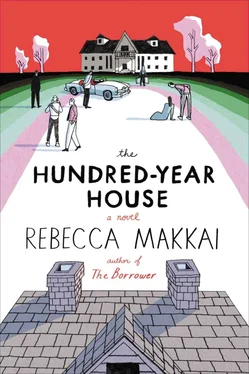Eddie Parfitt, on the second floor, trying to remember what he’s writing and why he’s writing it, wondering what cold and congealed substance his blood has become.
John and Ralph, the two brothers who work the grounds, oiling the old wheelbarrow.
Marceline, settled now in the yellow room, swearing in German at a script never meant for words.
Gamby on the train, his daughter curled against his lap, her yellow hair spilling down his leg, her whole body expanding with every breath.
Eddie, not knowing to let himself in, had knocked patiently at the downstairs door till Alfie barked and found Samantha. She led him up through the kitchen, and into her own rooms rather than the office, so they’d have privacy from Beatrice. She gave him the Morris chair and took the rocker herself. Poor thing, so awkward and formal. He was particularly nervous now, sucking in the lips on his little face until he resembled a gargoyle. He looked around the room, at her desk, her file cabinets, the Chinese lantern, the row of green apples ripening on the windowsill.
He took a great breath and said, “I wasn’t leaving till the end of September. But I think I might go tomorrow morning.” His palms flat on the arms of the chair. It dwarfed him.
“Oh,” she said. “Oh dear.” But she wasn’t surprised at all. He’d stayed in bed so much, was so silent at breakfast, and talked at dinner only in a rushed, anxious way. (Zilla, who noticed everything, had told Samantha to keep an eye on him. “He’s twenty-one,” she said. “Can you imagine, coming here right from school and expecting yourself to be brilliant?” “He’s already brilliant,” Samantha had protested. “He published two collections at Princeton, and everyone’s talking about him.” “Well, regardless, he’s raw. And he’s afraid of the house.”)
Samantha looked at him now, the way his face had thinned in the two weeks he’d been here. She said, “You can leave whenever you need. But I hope there’s nothing wrong.”
“I’ve been doing good work here,” he said. “Really good work. I’ve finished twelve poems, and they’re different from anything I’ve made before. They’re darker, actually. I never work this fast. No one does! But that gets at the problem. I’m not — something’s wrong with me. I feel this place is going to swallow me whole.”
“The house can have an effect.”
“It’s nothing at all about the way things are run.”
“Eddie, why don’t you see how you feel in the morning? Just enjoy yourself tonight, relax a bit, and let me know tomorrow.”
He dropped his shoulders and smiled. “I will.”
“You’ll be getting out just in time, too. Mr. Devohr arrives tonight. Lord knows what’ll happen to us all in the morning. We’ll be walking the plank, I fear.” She said it lightly, but really she’d spent the past day calculating frantically: the new artists due next Tuesday, the impossibility of sending Ludo back to Mussolini, the number of trustees who might eventually support a reconfigured Laurelfield, maybe on a farm up in Wisconsin. The finished canvases she was still storing in the basement for a painter who’d left in June. The prospect of having no home. Gamby might give her a month to clear out. Or maybe it was nothing. Maybe she was panicking over nothing.
They stood and walked back through the kitchen.
“May I inquire what happened to your wall?” he said.
She’d already forgotten the ugly black hole beside the icebox, the size of a large fist. And around it a larger circle of blackened wall, a foot in diameter. “I’ll have to cover it before Mr. Devohr arrives. I had a lamp with no shade, and it fell against the wall this morning. When I smelled it, I thought I must have burned my lunch — and then I remembered I wasn’t cooking anything.”
Beatrice’s voice, from the office: “We ought to dig all the way through and install the world’s shortest pneumatic tube!”
Eddie laughed. “The ghost has been at the lamps lately. She snuffed ours out in the library last night.”
“That lets me off the hook, doesn’t it?”
She gets up early to work. Some of us saw her notes on the first script, when she left them by the coffee pot. The Aspern Papers , from a Henry James story, a failure in its first filming and sure to fail as a talkie. Because the only real characters are the old woman, her plain spinster niece, and the man obsessed with obtaining the old woman’s love letters. No part here for Clara Bow, no room for a WAMPAS Baby Star. Only, if Marceline is smart, and we think she is, she’ll show the audience some scenes from the past, when old Juliana was young and in love with the writer Aspern. But no, some of us argue: The whole point is the burning of the papers at the end, the fact that our man will never know the truth about the love affair. It would ruin it all, to show the past!
The other script, the one Marceline hasn’t yet begun, is Bluebeard . She told us at breakfast. No, not the pirate. His beard was black. Bluebeard was the killer. The one with all the wives. Remember, the key she can’t get the blood off? That one has potential.
Someone has heard that Marceline Horn once lived in sin with Ronald Coleman. Only it’s not a sin in Hollywood, is it? They have different gods out there.
Someone heard she spent two thousand dollars on a Chinese rug. We are disinclined to believe this.
Up here, she could concentrate. It wasn’t so much that she had heard Viktor’s feet through the Longhouse wall, and his humming, and occasionally the phonograph, but that she could feel him there, and it made her cold and it made her blood vibrate and every day she shrank. Every noise might have been his door closing, or opening, or him tapping on her window, or a woman — one of his dancing girls, or that waifish poet who left last Tuesday — coming to see him, to untuck his shirt, to lead him to the bed in the corner. So Zilla asked Samantha for the attic key, and Samantha gave it without comment, though she knew, they all knew, who wouldn’t have known? And so for the fourth day now she was working on a piece of linen that she’d tacked right to the floor, for lack of properly lit wall space. And also for the difference it made. To stand above it, to feel she was peering straight through the linen and into the rest of the house, Fannie’s bedroom below, and what was below that? The dining room. It was a hundred degrees up here, but still she was freezing from the inside out.
She wasn’t sure what this painting wanted to be. She’d tried for petallate, frilled, wet, but ultimately she found she couldn’t, in her state, create something verdant and expectant. She found five fallen oak leaves outside, early jumpers, stuck together with rain, not brown so much as opally pink, blushing at their early demise. And this was what she wanted to express now: a stack of soft, lovely suicides.
She’d had a letter that morning from Lemuel, holed up in Madison, “drowning in silver baths and sulphite,” trying to finish the prints for his show. He wanted her home. He wanted her to keep him safe from nightmares. He said he might go up in an airplane with Kneller, which she knew was meant as a threat, as he believed all planes crashed, and believed that he, in particular, was due a fiery death. If she could, she’d stay here forever. She’d be like Ludo, minus the marooning via political unrest. She’d beg Samantha to let her stay, and then stay longer, and stay longer, until she’d become a part of the furniture. Her room, like Ludo’s, would be permanently blocked off on Samantha’s color-coded chart. Except that Lemuel would die, he truly would. He’d stop eating, like Violet Devohr.
Читать дальше












